The Following piece was written by Shannon Biggs of Global Exchange, and Osprey Orielle Lake. You can also find it on the Women’s Earth and Climate Caucus news page.
——————————————————————————————-
‘When we speak of ecosystems as ‘resources’ — it is as if we are saying the Earth is in the business of liquidating itself.”
— Randy Kapashesit of the Cree Nation
The sacred fire was lit as over 100 primarily Indigenous peoples gathered—and hundreds more participated online—for the RIGHTS OF MOTHER EARTH: RESTORING INDIGENOUS LIFE WAYS OF RESPONSIBILITY AND RESPECT International Indigenous Conference APRIL 4 – 6, 2012 at Haskell Indian Nations University, Lawrence Kansas.
As Renee Gurneau of the Chippewa Nation explained, the fire is an important spiritual tradition acknowledging our relationship with the rest of creation in all things we do, and part of “getting into our ‘right Indigenous mind.’ As she said, “We must always give before we can take, and the fire reminds us of our Original Instructions and helps us wake up to our own knowledge.”
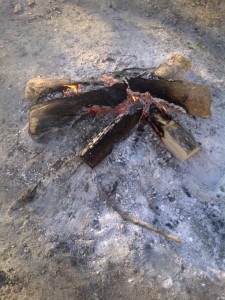
The Sacred Fire
Each day as we walked by the fire circle right outside the auditorium where the conference was held, we felt very grateful and honored to participate in this historic gathering to hold a discourse about Rights of Nature / Rights of Mother Earth with Indigenous leaders and activists from the Global North and South.
Conference organizers, Tom BK Goldtooth (Indigenous Environmental Network) and Dan Wildcat (Haskell University) stated, “This is the greatest challenge facing humanity in the 21st Century. How do we re-orientate the dominant industrialized societies so that they pursue human well-being in a manner that contributes to the health of our Mother Earth instead of undermining it? In other words – how do we live in harmony with Nature?”
Buen Vivir
In part, the gathering was a response to the Cochabamba World People’s Summit on Climate Change and the Rights of Mother Earth conference called forth by President Evo Morales of Bolivia who proposed that the United Nations adopt a declaration that recognizes that Nature or “Mother Earth” is an indivisible living community of interdependent beings with inherent rights, and that as human societies we have responsibilities to follow the true laws of nature, and to live within the carrying capacity of the planet.
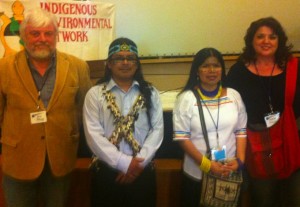
Marlon Santi and Patricia Gualinga Montalvo of the Sarayaku Tribe with Shannon Biggs and Ben Price
In the Kichwa language of the Indigenous people of Ecuador it is called “sumak kawsay,” in Spanish it is “Buen Vivir” — decolonial concepts that mean ‘living well’, as opposed to consumer-driven notions of living more. But how do we get there? Starting from where we are now, can we really envisage a future other than that which has come from enslaving nature, and treating all other life as mere “resources” for exploitation?
The conference focused on a system of earth jurisprudence (rights of nature) that views the natural world, Mother Earth, not as property to be destroyed at will, but as a rights bearing entity with legal standing in a court of law. The intent of the gathering was to bring primarily Indigenous people together with some non-Indigenous allies to explore questions about how the rights of nature legal framework could re-direct the dominant industrialized society to one of living in respect of natural laws.
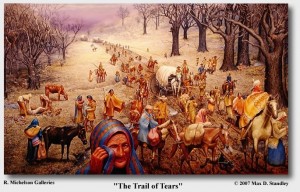
The Trail of Tears
The Trail of Tears, which refers to the forced resettlement of Native Americans from their homelands and spiritual sites to far-away encampments remains present in the stories of modern colonization, theft and destruction of lands throughout Indian country. It was quite humbling and heartbreaking to realize how little we learn in our conventional school systems about the history of Native American peoples, their brutal struggles, and their outstanding resilience to hundreds of years of ongoing assaults.
Modern stories of broken promises from government officials, corporations, speculators and lawyers have created a wariness among Native leaders to partner with outsiders, and for those of us “non-native allies” present, it was a constant learning of how to engage with love and humility in a space that was first and foremost—Indigenous. Tom Goldtooth spoke at the conference on the idea of Indigenous leaders partnering with non-native allies to promote Rights for Nature:
Although not everyone saw eye-to-eye throughout the 3-day event, it was clear to all in attendance that the basic tenants proposed by the rights of nature framework, while new to western legal systems, are actually based on”original instructions” — Indigenous worldviews and philosophies that uphold the essential interrelatedness of all life and our human responsibility to respect and protect the natural world that we are part and particle of. This basic unifying principle has the potential to create new alliances and protections for every community as we face the challenging years ahead.
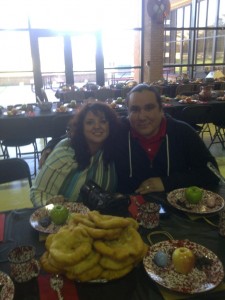
Shannon Biggs and Clayton Thomas-Muller, Tar Sands Campaign Director for IEN enjoy some traditional eats
Almost all of the speakers at the conference were Indigenous—from as far away as Hawaii, Ecuador and Canada. Shannon Biggs of Global Exchange (co-author of this blog) and Ben Price from the Community Environmental Legal Defense Fund had the honor and opportunity to present the work we do with communities confronted by unwanted and dangerous projects to write new laws to recognize legal rights for communities and ecosystems.
• Watch a video of Shannon and Ben present on Community and Nature’s Rights.
• For video and audio archive of the conference, go here.
Rights and Responsibilities to Future Generations
Representing Global Exchange and the Women’s Earth and Climate Caucus as well as our shared collaboration with the Global Alliance for the Rights of Nature, we listened and learned a great deal from Indigenous leaders exploring concerns about rights of nature and how they might interface or interfere with existing Indian Native and First Nations laws. We have much to learn about how Indigenous communities define responsibilities as much as rights, and that the rights of future generations—not just of human but all species—is critical to building a bridge toward common understanding in the shared work that we do.
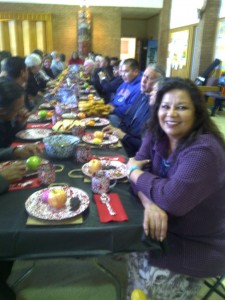
Renee Gurneau at the Harvest Banquet hosted by the Osage Nation
The call for environmental justice in Indigenous communities on the frontlines of uranium mining, tar sands extractions, water takings and more are all potential opportunities for rights of nature and community rights to come into action.
We look forward to further alliance building with Indigenous communities and offering all that we can as we look towards the Rio + 20 Earth Summit and beyond and how we can create broad support for the Universal Declaration of the Rights of Mother Earth and care for all of our communities and bioregions in a truly just and respectful manner. As Tom Goldtooth said at the conference,
“We cannot flourish breaking the laws of nature. Rights of Nature is a human recognition that we are part of a larger Earth community and if we want to continue we must recognize the laws of that community; the true system governing our own well being.”
Further resources/links
- Watch videos of Tom Goldtooth and Shannon Biggs discussing the Rights of Nature on the Council of Canadians’ ‘System Change, Not Climate Change’ website.
- Hawaiian Rev. M. Kalani Souza, storyteller, songwriter, musician, poet, philosopher, priest, political satirist, and peacemaker joins a banjo playing friend impromptu for a song on the grass at Haskell College.
- Shannon Biggs and Osprey Orielle Lake are offering Rights of Nature Trainings through the Women’s Earth and Climate Caucus and if interested, please contact Wyolah Garden (wgarden@ix.netcom.com). Also if you are interested in hosting a Rights of Nature Training in your community please contact Wyolah Garden.
————————————–
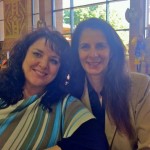
Shannon and Osprey at the conference
Shannon Biggs is the Director of the Community Rights program at Global Exchange. She recently co-authored a book, Building the Green Economy: Success Stories from the Grass Roots (PoliPoint Press). Her current work focuses on assisting communities confronted by corporate harms to enact binding laws that place the rights of communities and nature above the claimed legal “rights” of corporations.
Osprey Orielle Lake is a lifelong advocate of environmental justice and societal transformation. She is the Director of the Women’s Earth and Climate Caucus (WECC) and an International Advocate for the Global Alliance for the Rights of Nature. Her book, Uprisings for the Earth: Reconnecting Culture with Nature (White Cloud Press) is a 2011 Nautilus Book Award winner.
